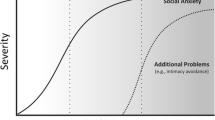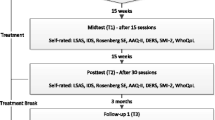Abstract
Increasing recognition of the heterogeneity of social phobia has led to the development of various subtyping classification schemes and controversy over the boundary between social phobia and avoidant personality disorder (APD). This study investigated the utility of one subtyping system by comparing efficacy of cognitive-behavioral group therapy for generalized social phobia (fears in all major situational domains) and nongeneralized social phobia (fears in multiple domains but at least one unaffected domain). Overall, most subjects improved in treatment, with generalized and nongeneralized social phobics making similar gains. However, because generalized social phobics were more impaired prior to treatment, they continued to be more impaired after treatment on some measures. A second hypothesis that social phobics with APD would respond more poorly to treatment than social phobics without APD was not supported. This study adds to the growing evidence that social phobia and APD, as defined by DSM-III-R, may not be conceptually distinct. Clinical and conceptual implications and directions for future research are discussed.
Similar content being viewed by others
References
Alden, L. E. (1989). Short-term structured treatment for avoidant personality disorder.Journal of Consulting and Clinical Psychology, 57, 756–764.
Alden, L. E., & Capreol, M. J. (1993). Avoidant personality disorder: Interpersonal problems as predictors of treatment response.Behavior Therapy, 24, 357–376.
American Psychiatric Association. (1980).Diagnostic and statistical manual of mental disorders (3rd ed.). Washington DC: Author.
American Psychiatric Association. (1987).Diagnostic and statistical manual of mental disorders (3rd ed., rev.). Washington DC: Author.
Barlow, D. H. (1988).Anxiety and its disorders: The nature and treatment of anxiety and panic. New York: Guilford Press.
Boone, M. L., Lewin, M. R., McNeil, D. W., & Kahle, A. L. (1989, November).Differentiating circumscribed speech anxiety and generalized social anxiety using psychophysiological and cognitive methods. Paper presented at the annual meeting of the Association for the Advancement of Behavior Therapy, Washington, DC.
Cohen, J. (1977).Statistical power analysis for the behavioral sciences (4th ed.). New York: Academic Press.
DiNardo, P., & Barlow, D. H. (1988).The Anxiety Disorders Interview Schedule—revised. Albany, NY: Graywind Publications.
Gelernter, C. S., Uhde, T. W., Cimbolic, P., Arnkoff, D. B., Vittone, B. J., Tancer, M. E., & Bartko, J. J. (1991). Cognitive-behavioral and pharmacological treatment of social phobia.Archives of General Psychiatry, 48, 938–945.
Heimberg, R. G. (1989).Cognitive and behavioral treatment for social phobia: A critical analysis.Clinical Psychology Review, 9, 107–128.
Heimberg, R. G. (1991).A manual for conducting cognitive-behavioral group therapy for social phobia (2nd ed.). Unpublished manuscript available from the Center for Stress and Anxiety Disorders, Pine West Plaza, Bldg. 4, Washington Avenue Extension, Albany, NY 12205.
Heimberg, R. G., Dodge, C. S., & Becker, R. E. (1987). Social phobia. In L. Michelson & M. L. Ascher (Eds.),Anxiety and stress disorders (pp. 280–309). New York: Guilford Press.
Heimberg, R. G., Dodge, C. S., Hope, D. A., Kennedy, C. R., Zollo, L., & Becker, R. E. (1990). Cognitive behavioral group treatment for social phobia: Comparison with a credible placebo control.Cognitive Therapy and Research, 14, 1–23.
Heimberg, R. G., Holt, C. S., Schneier, F. R., Spitzer, R. L., & Liebowitz, M. L. (1993). The issue of subtypes in the diagnosis of social phobia.Journal of Anxiety Disorders, 7, 249–270.
Heimberg, R. G., Hope, D. A., Dodge, C. S., & Becker, R. E. (1990). DSM-III-R subtypes of social phobia: Comparison of generalized social phobics and public speaking phobics.Journal of Nervous and Mental Disease, 187, 172–179.
Heimberg, R. G., & Liebowitz, M. R. (1992, April).A multi-center comparison of the efficacy of phenelzine and cognitive-behavioral group treatment for social phobia. Paper presented at the 12th National Conference on Anxiety Disorders, Houston.
Heimberg, R. G., Salzman, D., Holt, C. S., & Blendell, K. (1993). Cognitive-behavioral group treatment for social phobia: Effectiveness at five-year follow-up.Cognitive Therapy and Research, 17, 325–340.
Herbert, J. D., Franklin, M. E., Perry, K. J., Foa, E. B., DiSavino, P., & Hope, D. A. (1993, November).Cognitive-behavioral group therapy with and without social skills training in the treatment of generalized social phobia. Paper presented at the annual meeting of the Association for the Advancement of Behavior Therapy, Atlanta.
Herbert, J. D., Hope, D. A., & Bellack, A. S. (1992). Validity of the distinction between generalized social phobia and avoidant personality disorder.Journal of Abnormal Psychology, 101, 332–339.
Holt, C. S., Heimberg, R. G., & Hope, D. A. (1992). Avoidant personality disorder and the generalized subtype of social phobia,Journal of Abnormal Psychology, 101, 318–325.
Hope, D. A., & Heimberg, R. G. (1993a). Social phobia. In C. G. Last & M. Hersen (Eds.),Adult behavior therapy casebook (pp. 125–138). New York: Plenum Press.
Hope, D. A., & Heimberg, R. G. (1993b). Social phobia and social anxiety. In D. H. Barlow (Ed.),Clinical handbook of psychological disorders (pp. 99–136). Guilford Press.
Hope, D. A., Heimberg, R. G., & Bruch, M. A. (1995). Dismantling cognitive-behavioral group therapy for social phobia.Behaviour Research and Therapy, 33, 1–14.
Hope, D. A., Holt, C. S., & Heimberg, R. G. (1993). Social phobia. In T. R. Giles (Ed.),Handbook of effective psychotherapy. New York: Plenum Press.
Jerremalm, A., Jansson, L., & Öst, L.-G. (1986). Cognitive and physiological reactivity and the effects of different behavioral methods in the treatment of social phobia.Behaviour Research and Therapy, 24, 171–180.
Marks, I. M., & Mathews, A. M. (1979). Brief standard self-rating scale for phobic patients.Behaviour Research and Therapy, 17, 263–267.
McNeil, D. W., Ries, B. J., Taylor, L. J., Boone, M. L., Carter, L. E., Turk, C. L., & Lewin, M. R. (1995). Comparison of social phobia subtypes using Stroop tests.Journal of Anxiety Disorders, 9, 47–57.
Mersch, P. P., Emmelkamp, P. M. G., Bogels, S. M., & van der Sleen, J. (1989). Social phobia: Individual response patterns and the effects of behavioral and cognitive interventions. Behaviour Research and Therapy, 27, 421–434.
National Institute of Mental Health (1985). Clinical Global Impressions Scale.Psychopharmacology Bulletin, 21, 839–843.
Öst, L.-G., Jerremalm, A., & Johansson, J. (1981). Individual response patterns and the effects of different behavioral methods in the treatment of social phobia.Behaviour Research and Therapy, 19, 1–16.
Reich, J., Noyes, R., Jr., & Yates, W. (1989). Alprazolam treatment of avoidant personality traits in social phobic patients.Journal of Clinical Psychiatry, 50, 91–95.
Renneberg, B., Goldstein, A. M., Phillips, D., & Chambless, D. L. (1990). Intensive behavioral group treatment of avoidant personality disorder.Behavior Therapy, 21, 363–377.
Schneier, F. R., Spitzer, R. L., Gibbon, D., Fyer, A., & Liebowitz, M. R. (1991). The relationship of social phobia subtypes and avoidant personality disorder.Comprehensive Psychiatry, 32, 1–5.
Spitzer, R. L., Williams, J. B. W., Gibbon, M., & First, M. B. (1990).Structured Clinical Interview for DSM-III-R. Washington, DC: American Psychiatric Press.
Task Force on DSM-IV. (1993).DSM-IV draft criteria: 3/1/93. Washington DC: American Psychiatric Association.
Turner, R. M. (1987). The effects of personality disorder diagnosis on the outcome of social anxiety symptom reduction.Journal of Personality Disorders, 1, 136–143.
Turner, S. M., Beidel, D. C., Dancu, C. V., & Keys, D. J. (1986). Psychopathology of social phobia and comparison to avoidant personality disorder.Journal of Abnormal Psychology, 95, 389–394.
Turner, S. M., Beidel, D. C., Dancu, C. V., & Stanley, M. A. (1989). An empirically derived inventory to measure social fears and anxiety: The Social Phobia Anxiety Inventory.Psychological Assessment, 1, 35–40.
Turner, S. M., Beidel, D. C., & Townsley, R. M. (1992). Social phobia: A comparison of specific and generalized subtypes and avoidant personality disorder.Journal of Abnormal Psychology, 101, 326–331.
Watson, D., & Friend, R. (1969). Measurement of social evaluative anxiety.Journal of Consulting and Clinical Psychology, 33, 448–457.
Widiger, T. A. (1992). Generalized socia phobia versus avoidant personality disorder: A commentary on three studies.Journal of Abnormal Psychology, 101, 340–343.
Wolpe, J., & Lazarus, A. A. (1966).Behavior therapy techniques. New York: Pergamon Press.
Author information
Authors and Affiliations
Additional information
Completion of this manuscript was supported in part by grant number MH 48751 from the National Institute of Mental Health to the first author. The authors wish to thank Alan S. Bellack for his support in the completion of this study and Jack Blanchard, Eileen Wade, and Abby Michalski for serving as cotherapists. Portions of this study were presented at the annual meeting of the Association for the Advancement of Behavior Therapy, San Francisco, 1990.
Rights and permissions
About this article
Cite this article
Hope, D.A., Herbert, J.D. & White, C. Diagnostic subtype, avoidant personality disorder, and efficacy of cognitive—behavioral group therapy for social phobia. Cogn Ther Res 19, 399–417 (1995). https://doi.org/10.1007/BF02230408
Issue Date:
DOI: https://doi.org/10.1007/BF02230408




